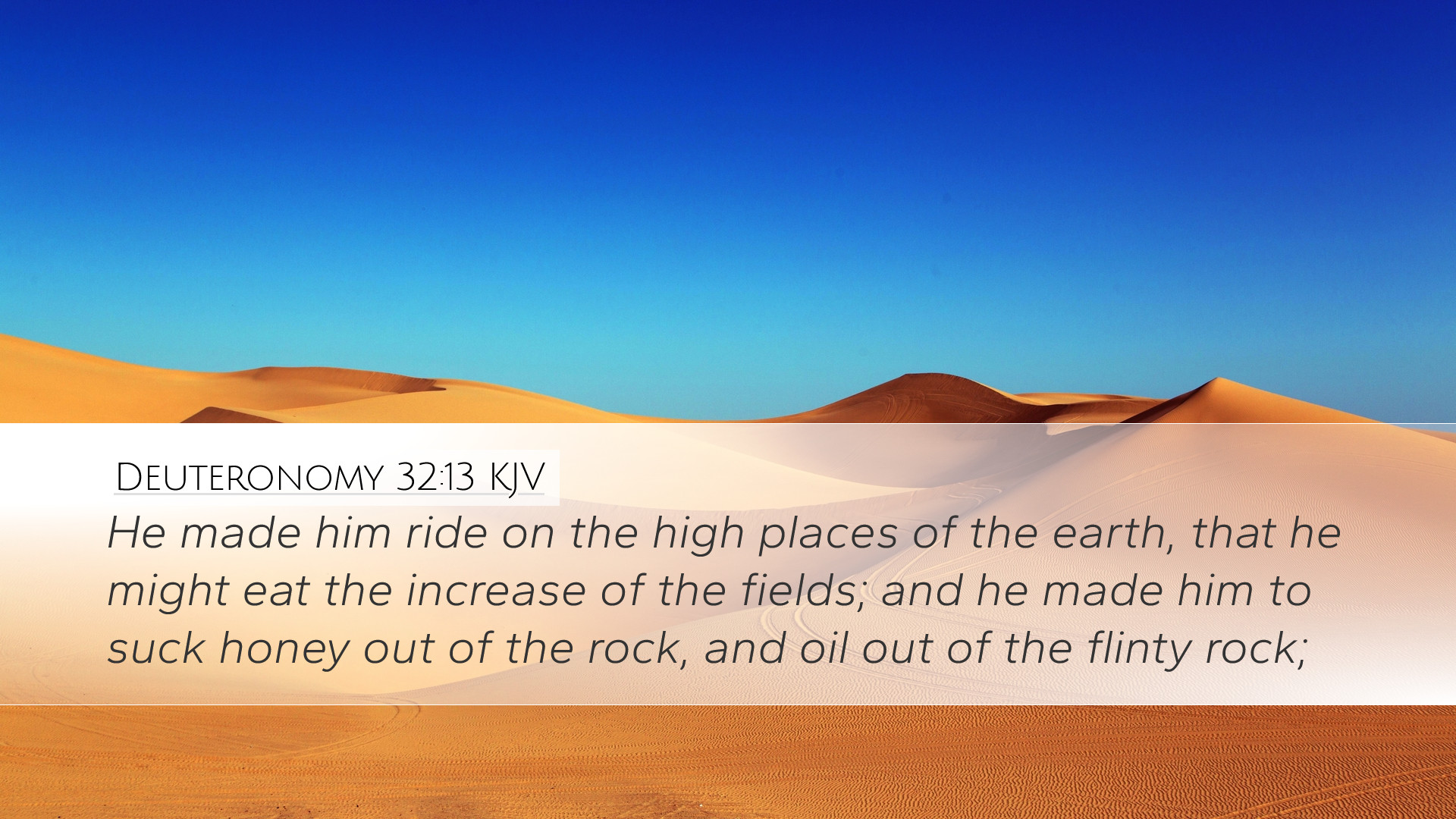Commentary on Deuteronomy 32:13
Deuteronomy 32:13: "He made him ride on the high places of the earth, that he might eat the increase of the fields; and he made him to suck honey out of the rock, and oil out of the flinty rock."
Introduction
This verse is part of the Song of Moses, a poetic reflection on God’s faithfulness and the blessings bestowed upon Israel. In this verse, the imagery used speaks of divine provision and the abundance found in a covenant relationship with God. This commentary seeks to synthesize insights from various public domain sources to provide a comprehensive understanding of this passage for pastors, theologians, and students of the Word.
Contextual Overview
The Song of Moses, found in Deuteronomy 32, is a crucial text in the Pentateuch that assists Israel in remembering their unique relationship with God. It emphasizes God’s character and the response expected from His people. The verses surrounding Deuteronomy 32:13 set the context of divine salvation and blessing contrasted with Israel’s future rebellion.
Historical and Theological Significance
Moses, as the author of this passage, speaks to a generation of Israelites poised to enter the Promised Land. He reminds them of previous provisions and blessings from God, highlighting the continuity of God’s covenantal faithfulness throughout their journey.
Exegesis of Key Phrases
“He made him ride on the high places of the earth”
Matthew Henry notes that the "high places" symbolize elevated status and security granted by God. It indicates a place of prominence and blessing, reserved for those favored by the Almighty.
Albert Barnes expounds that riding on high places signifies experiencing God's blessings in places of honor and distinction, showcasing divine elevation and triumph over challenges.
“Eat the increase of the fields”
This phrase suggests abundance in agricultural produce, a key element in Israel's economy. Adam Clarke comments that this provision indicates not just physical sustenance but speaks metaphorically of spiritual nourishment and abundance that comes from God’s grace.
“Suck honey out of the rock”
The imagery here is striking; rock signifies hardness, and honey represents sweetness. Matthew Henry suggests that such sustenance from an unyielding source represents the miraculous nature of God’s provision, where sweetness (blessing) can emerge from the harshness (hardship).
“Oil out of the flinty rock”
Oil is essential for nourishment, light, and anointing. Albert Barnes interprets this as illustrating God’s ability to bring forth blessing and productivity from seemingly barren and harsh conditions in life, emphasizing God’s unbounded capability to provide.
Theological Implications
The verse encapsulates the essence of God as a provider, reflecting not only provision for Israel but for all believers. It opens up discussions on the implications of divine blessing in adverse situations. This challenges the reader to consider their perspectives on hardship and abundance.
Divine Providence and Human Gratitude
This passage also emphasizes the importance of recognizing and valuing God’s gifts. Adam Clarke urges that, in light of such abundant provision, the response must be one of gratitude and acknowledgment of the sovereignty of God in every area of life, both spiritual and material.
The Role of Faith in Understanding Abundance
Believers are called to trust in God’s provision during lean times. Matthew Henry asserts that understanding God’s capacity to bring forth blessing from adversity strengthens faith and shapes a believer's identity in Christ, which is paramount in pastoral teaching and teaching ministries.
Conclusion
Deuteronomy 32:13 serves as a powerful testament to God’s amazing ability to provide—an encouragement to the faithful that divine resources are available even in the most unlikely situations. The insights from various commentators enrich our understanding of divine providence, the nature of blessings, and the necessity of human response to God’s gifts. Like Israel, we are prompted to remember our own spiritual and material blessings, thereby nurturing a heart of gratitude in our worship and daily lives.
Reflection Questions
- How can we cultivate gratitude for the blessings we receive from God, especially in challenging times?
- What does it mean to experience God’s provision in our contemporary lives as believers?
- In what ways can the church help its members recognize the 'honey' and 'oil' emerging from 'rocky' circumstances?


